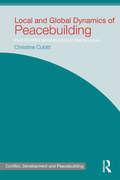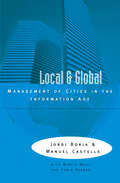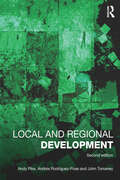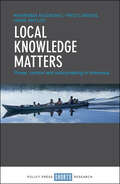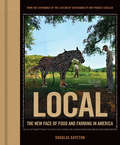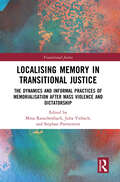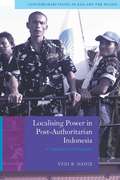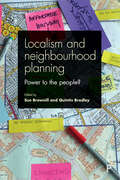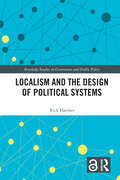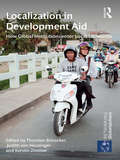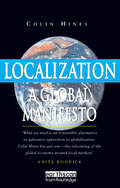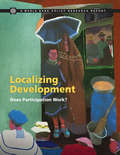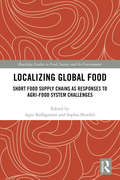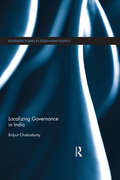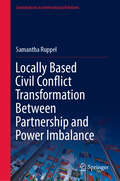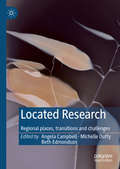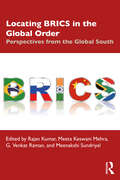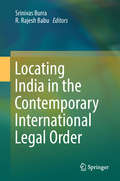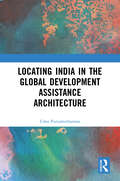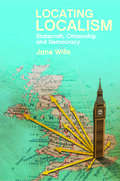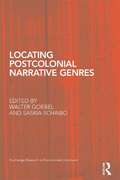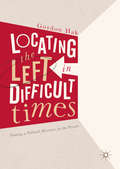- Table View
- List View
Local and Global Dynamics of Peacebuilding: Postconflict reconstruction in Sierra Leone (Studies in Conflict, Development and Peacebuilding)
by Christine CubittLocal and Global Dynamics of Peacebuilding examines the complex contributing factors which led to war and state collapse in Sierra Leone, and the international peacebuilding and statebuilding operations which followed the cessation of the violence. This book presents nuanced and contextually specific knowledge of Sierra Leone’s political and war histories, and the outcomes of the implementation of programmes of post-conflict reforms. It embodies an analysis of the complex challenges involved in aligning international norms and values to local expectations and local priorities, and examines the role of local and global actors and structures in attempts to build a strong state and lasting peace. Using a theoretical framework informed by ‘liberal peace’ philosophy, as well as detailed and nuanced empirical evidence from the field, the book constructs a critical analysis of the contemporary global paradigm for building longer-term peace in war-torn, fractured and fragile societies. This book will be of much interest to students of peacebuilding, war and conflict studies, development studies, African politics, and IR/security studies.
Local and Global: The Management of Cities in the Information Age
by Manuel Castells Jordi BorjaThis text challenges the belief that cities will eventually disappear as territorial forms of social organization as new information technologies permit the articulation of social processes without regard for distance, arguing that the specific role of cities will become more important, and proposing that a dynamic and creative relationship be built up between the local and the global. In this way, cities will remain the focus of social organization, political management and cultural expression, equipped to deal with the enormous social and environmental problems of urbanization.
Local and Regional Development
by Andy Pike Andrés Rodriguez-Pose John TomaneyActors and institutions in localities and regions across the world are seeking prosperity and well-being amidst tumultuous and disruptive shifts and transitions generated by: an increasingly globalised, knowledge-intensive capitalism; global financial instability, volatility and crisis; concerns about economic, social and ecological sustainability, climate change and resource shortages; new multi-actor and multi-level systems of government and governance and a re-ordering of the international political economy; state austerity and retrenchment; and, new and reformed approaches to intervention, policy and institutions for local and regional development. Local and Regional Development provides an accessible, critical and integrated examination of local and regional development theory, institutions and policy in this changing context. Amidst its rising importance, the book addresses the fundamental issues of ‘what kind of local and regional development and for whom?’, its purposes, principles and values, frameworks of understanding, approaches and interventions, and integrated approaches to local and regional development throughout the world. The approach provides a theoretically informed, critical analysis of contemporary local and regional development in an international and multi-disciplinary context, grounded in concrete empirical analysis from experiences in the global North and South. It concludes by identifying what might constitute holistic, inclusive, progressive and sustainable local and regional development, and reflecting upon its limits and political renewal.
Local and State Government: Government and Citizenship
by Etta JohnsonIt's about the responsibilities and functions of local and state government.
Local knowledge matters: Power, context and policy making in Indonesia
by Fred Carden Kharisma NugrohoAvailable Open Access under CC-BY-NC licence. This book explores the critical role that local knowledge plays in public policy processes as well as its role in the co-production of policy relevant knowledge with the scientific and professional communities. The authors consider the mechanisms used by local organisations and the constraints and opportunities they face, exploring what the knowledge-to-policy process means, who is involved and how different communities can engage in the policy process. Ten diverse case studies are used from around Indonesia, addressing issues such as forest management, water resources, maritime resource management and financial services. By making extensive use of quotes from the field, the book allows the reader to ‘hear’ the perspectives and beliefs of community members around local knowledge and its effects on individual and community life.
Local: The New Face of Food and Farming in America
by Douglas GayetonCombining stunning visuals with insights and a lexicon of more than 200 agricultural terms explained by today’s thought leaders, Local showcases and explores one of the most popular environmental trends: rebuilding local food movements.When Douglas Gayeton took his young daughter to see the salmon run—a favorite pastime growing up in Northern California—he was devastated to find that a combination of urban sprawl, land mismanagement, and pollution had decimated the fish population.The discovery set Gayeton on a journey in search of sustainable solutions. He traveled the country, photographing and learning the new language of sustainability from today’s foremost practitioners in food and farming, including Alice Waters, Wes Jackson, Carl Safina, Temple Grandin, Paul Stamets, Patrick Holden, Barton Seaver, Vandana Shiva, Dr. Elaine Ingham, and Joel Salatin, as well as everyday farmers, fishermen, and dairy producers.Local: The New Face of Food and Farming blends their insights with stunning collage-like information artworks and Gayeton’s Lexicon of Sustainability, which defines and de-mystifies hundreds of terms like “food miles,” “locavore,” “organic,” “grassfed” and “antibiotic free.” In doing so, Gayeton helps people understand what they mean for their lives. He also includes “eco tips” and other information on how the sustainable movement affects us all every day.Local: The New Face of Food and Farming in America educates, engages, and inspires people to pay closer attention to how they eat, what they buy, and where their responsibility begins for creating a healthier, safer food system in America.
Localising Memory in Transitional Justice: The Dynamics and Informal Practices of Memorialisation after Mass Violence and Dictatorship
by Mina Rauschenbach, Julia Viebach, and Stephan ParmentierThis collection adds to the critical transitional justice scholarship that calls for “transitional justice from below” and that makes visible the complex and oftentimes troubled entanglements between justice endeavours, locality, and memory-making. Broadening this perspective, it explores informal memory practices across various contexts with a focus on their individual and collective dynamics and their intersections, reaching also beyond a conceptualisation of memory as mere symbolic reparation and politics of memory. It seeks to highlight the hidden, unwritten, and multifaceted in today’s memory boom by focusing on the memorialisation practices of communities, activists, families, and survivors. Organising its analytical focal point around the localisation of memory, it offers valuable and new insights on how and under what conditions localised memory practices may contribute to recognition and social transformation, as well as how they may at best be inclusive, or exclusive, of dynamic and diverse memories. Drawing on inter- and multi-disciplinary approaches, this book brings an in-depth and nuanced understanding of local memory practices and the dynamics attached to these in transitional justice contexts. It will be of much interest to students and scholars of memory and genocide studies, peace and conflict studies, transitional justice, sociology, and anthropology.
Localising Power in Post-Authoritarian Indonesia
by Vedi HadizThis book is about how the design of institutional change results in unintended consequences. Many post-authoritarian societies have adopted decentralization-effectively localizing power-as part and parcel of democratization, but also in their efforts to entrench "good governance. " Vedi Hadiz shifts the attention to the accompanying tensions and contradictions that define the terms under which the localization of power actually takes place. In the process, he develops a compelling analysis that ties social and institutional change to the outcomes of social conflict in local arenas of power. Using the case of Indonesia, and comparing it with Thailand and the Philippines, Hadiz seeks to understand the seeming puzzle of how local predatory systems of power remain resilient in the face of international and domestic pressures. Forcefully persuasive and characteristically passionate, Hadiz challenges readers while arguing convincingly that local power and politics still matter greatly in our globalized world.
Localism and Neighbourhood Planning: Power to the People?
by Sue Brownill and Quintin BradleyGovernments around the world are seeing the locality as a key arena for effecting changes in governance, restructuring state/civil society relations and achieving sustainable growth. This is the first book to critically analyse this shift towards localism in planning through exploring neighbourhood planning; one of the fastest growing, most popular and most contentious contemporary planning initiatives. Bringing together original empirical research with critical perspectives on governance and planning, the book engages with broader debates on the purposes of planning, the construction of active citizenship, the uneven geographies of localism and the extent to which power is actually being devolved. Setting this within an international context with cases from the US, Australia and France the book reflects on the possibilities for the emergence of a more progressive form of localism.
Localism and the Design of Political Systems (Routledge Studies in Governance and Public Policy)
by Rick HarmesThis book examines localism as a political idea and policy approach and explains what localism is about, why it is growing in importance and how it relates to other themes in politics. Illustrated with case studies from the United Kingdom, mainland Europe and the Indian sub-continent, the book analyses localism in conceptual and theoretical terms and locates it within the overall landscape of political thought. Key themes covered in the book include place, space and scale; decentralization and devolution; multi-level governance; public value; democracy and empowerment; and political design. With the focus on the bottom-up, constructivist aspects of localism, the book argues that localism is most likely to work successfully in a political order where sovereignty is ‘distributed’ across various social spheres and levels of government. It offers a comprehensive view of localism by synthesizing its various strands and creating a distinctive framework for design and evaluation. This book will be of particular interest to scholars, students and practitioners of localism, particularly within local and regional government, public administration and policy, human and political geography, and urban studies.
Localism and the Design of Political Systems (Routledge Studies in Governance and Public Policy)
by Rick HarmesThis book examines localism as a political idea and policy approach and explains what localism is about, why it is growing in importance and how it relates to other themes in politics.Illustrated with case studies from the United Kingdom, mainland Europe and the Indian sub-continent, the book analyses localism in conceptual and theoretical terms and locates it within the overall landscape of political thought. Key themes covered in the book include place, space and scale; decentralization and devolution; multi-level governance; public value; democracy and empowerment; and political design. With the focus on the bottom-up, constructivist aspects of localism, the book argues that localism is most likely to work successfully in a political order where sovereignty is ‘distributed’ across various social spheres and levels of government. It offers a comprehensive view of localism by synthesizing its various strands and creating a distinctive framework for design and evaluation.This book will be of particular interest to scholars, students and practitioners of localism, particularly within local and regional government, public administration and policy, human and political geography, and urban studies.The Open Access version of this book, available at www.taylorfrancis.com, has been made available under a Creative Commons Attribution-Non Commercial-No Derivatives (CC-BY-NC-ND) 4.0 license.
Localization in Development Aid: How Global Institutions enter Local Lifeworlds (Rethinking Globalizations)
by Thorsten Bonacker Judith Von Heusinger Kerstin ZimmerThis edited volume brings together the work of scholars from different disciplines including sociology, political science and anthropology, and analyses how global institutions are embedded in local contexts within development aid. It examines theoretical and empirical implications of the diffusion and anchoring of world polity institutions at the local and global levels. The volume furthers the understanding of the dynamics of norm negotiation and glocalization processes in culturally varied societies in an era of globalization. Themes and topics covered include: children and human rights, gender mainstreaming, multi-level actor partnerships, anti-corruption programming, local ownership, land rights and corporate social responsibility. Bringing together expert contributors, this comprehensive volume will be an invaluable resource for all scholars of localization and globalization studies, as well as those in the field of international relations.
Localization: A Global Manifesto
by Colin HinesLocalization is a manifesto to unite all those who recognize the importance of cultural, social and ecological diversity for our future - and who do not aspire to a monolithic global consumer culture. It is a passionate and persuasive polemic, challenging the claims that we have to be 'internationally competitive' to survive and describing the destructive consequences of globalization. This book is unique in going beyond simply criticizing free trade and globalization trends. It details self-reinforcing policies to create local self-sufficiency and shows clearly that there is an alternative to globalization - to protect the local, globally.
Localizing Development
by Ghazala Mansuri Vijayendra RaoThe Policy Research Report Localizing Development: Does Participation Work? brings analytical rigor to a field that has been the subject of intense debate and advocacy, and billions of dollars in development aid. It briefly reviews the history of participatory development and argues that its two modalities, community-based development and local decentralization, should be treated under the broader unifying umbrella of local development. It suggests that a distinction between organic participation (endogenous efforts by civic activists to bring about change) and induced participation (large-scale efforts to engineer participation at the local level via projects) is key, and focuses on the challenges of inducing participation. The report provides a conceptual framework for thinking about participatory development and then uses this framework to conduct a comprehensive review of the literature. The framework develops the concept of civil society failure and explains its interaction with government and market failures. It argues that participatory development, which is often viewed as a mechanism for bypassing market and government failures by harnessing civic capacity, ought to be seen instead as a mechanism that, if done right, could help to repair important civil society failures. It distills literature from anthropology, economics, sociology, and political science to outline the challenges for effective policy in this area, looking at issues such as the uncertainty of trajectories of change, the importance of context, the role of elite capture and control, the challenge of collective action, and the role of the state. The review of the evidence looks at a variety of issues: the impact of participatory projects on inclusion, civic capacity, and social cohesion; on key development outcomes, such as income, poverty, and inequality; on public service delivery; and on the quality of local public goods. It draws on the evidence to suggest several recommendations for policy, emphasizing the key role of learning-by-doing. It then reviews participatory projects funded by the World Bank and finds the majority lacking in several arenas – particularly in paying attention to context and in creating effective monitoring and evaluation systems that allow for learning.
Localizing Global Food: Short Food Supply Chains as Responses to Agri-Food System Challenges (Routledge Studies in Food, Society and the Environment)
by Agni Kalfagianni Sophia SkordiliShort food supply chains (SFSCs) rely primarily on local production and processing practices for the provision of food and are, in principle, more sustainable in social, economic and environmental terms than supply chains where production and consumption are widely separated. This book reviews and assesses recent initiatives on this topic from an interdisciplinary perspective. In theoretical terms it draws on and advances two key concepts, namely, place (particularly embeddedness in local economic networks and communities) and governance (particularly in addressing sustainability concerns in an inclusive and socially just manner). Empirically, the book examines a diverse set of SFSCs such as small-scale entrepreneurship, farmers’ markets, community supported agriculture and grassroots and solidarity networks. The main examples discussed are from Europe and North America, but the issues are applicable in a global context. The book is of interest to advanced students, researchers and professionals in food studies, sociology, geography, planning, politics and environmental studies.
Localizing Governance in India (Routledge Studies in South Asian Politics)
by Bidyut ChakrabartyParticipatory governance has a long history in India and this book traces historical-intellectual trajectories of participatory governance and how older Western discourses have influenced Indian policymakers. While colonial rulers devolved power to accommodate dissenting voices, for independent India, participatory governance was a design for democratizing governance in its true sense. Participation also acted as a vehicle for localizing governance. The author draws on both Western and non-Western theoretical treatises and the book seeks to conceptualize localizing governance also as a contextual response. It also makes the argument that despite being located in different socio-economic and political milieu, thinkers converge to appreciate localizing governance as perhaps the only reliable means to democratize governance. The book aims to confirm this argument by reference to sets of evidence from the Indian experience of localizing governance. By attempting a genealogy of participatory governance in the West and in India, and an empirical study of participatory governance in India, the book sheds light on the exchange of ideas and concepts through space and time, thus adding to the growing body of literature in the social sciences on ‘conceptual flow’. It will be of interest to political scientists and historians, in particularly those studying South Asia.
Locally Based Civil Conflict Transformation Between Partnership and Power Imbalance (Contributions to International Relations)
by Samantha RuppelThis book examines the processes and dynamics of cooperation between different actors in civil peace service projects in Kenya, Sierra Leone and Liberia. The joint handling of conflicts and peacebuilding challenges by local and international actors has a long tradition in German peace work and is becoming increasingly important in a globalized world. Therefore, the book explores the question, relevant for both academia and peace practitioners, to what extent an equal partnership can exist in the context of civil conflict transformation. By focusing on the opportunities and challenges of cooperation, the work succeeds in focusing on everyday activities, analyzing the actual processes and frictions of peace work, and making a valuable contribution to critical peace research and the discussion of hybridity and friction.
Located Research: Regional places, transitions and challenges
by Angela Campbell Beth Edmondson Michelle DuffyThis book examines the diversity of practice in regional research and its contribution to local, national and global issues. Three themes are advanced here: Place and change, Transition and resilience, and Challenges for the future. Contributors embrace frameworks of co-design and transdisciplinary practice to build communities of practice in response to lived experience in regional contexts. Their work highlights the strategic importance of a regional focus at a time when global connectivity and mobility is increasing and the complexity of ‘wicked’ problems demands more than one approach or solution. Such complex problems require nuanced, and at times ‘bespoke’ methodological approaches to better understand and support not just regional adaptation, resilience and transformation, but to manage all these things at a time when change is everywhere.
Locating BRICS in the Global Order: Perspectives from the Global South
by Rajan Kumar Meeta Keswani Mehra G. Venkat Raman Meenakshi SundriyalBRICS is conceivably the most formidable organisation to have emerged in the post-Cold War period in the non-Western world. This book highlights the significance of BRICS in a wider global context and foregrounds the long-pending demand for the reform of global governance institutions. The volume: • Traces how the organisation came into being and looks at the distinct norms and principles espoused by it • Discusses the glaring limitations of the existing institutions of global governance • Explores the economic growth and the rising political influence of BRICS states • Analyses the internal threats to the survival of the organisation and assesses its prospects in the foreseeable future. A significant intervention in situating BRICS as one of the major players in global governance, the book will be of great interest to students and scholars of international political economy, international business and finance, international relations, politics, and Global South Studies.
Locating Global Advantage: Industry Dynamics in the International Economy
by Martin Kenney Richard FloridaWhat determines where an industry will be successful today, and why.
Locating India in the Contemporary International Legal Order
by R. Rajesh Babu Srinivas BurraThis book brings together disparate views which attempt to locate India in the contemporary international legal order. The essays endeavour to explore critically India’s role and attitude towards international law in various fields and its influence and contribution in the development of the latter. The contributions are also of historical value, as they analyse the present as part of a historical trajectory. Drawing upon the current and historical practices from their respective fields, the authors attempt to highlight some critical aspects involving India and international law. These aspects broadly underline India’s drift from its traditional role as an ally and proponent of the third world towards the pragmatism of self-interest, behaviour that is often compelled by internal political and economic conditions, as well as the dictates of external forces.
Locating India in the Global Development Assistance Architecture
by Uma PurushothamanThis book explores the intricate web of global development assistance, dissecting India’s unique position within this dynamic landscape, to study the country’s evolving role in International Development. The subject matter traces India’s trajectory from its early years as a recipient of foreign aid to its emergence as a key player in providing assistance to other nations. It also examines the motivations and challenges that shape India’s engagement in the global development arena.Presenting a detailed analysis of India’s responsibilities, aspirations, and the evolving nature of global aid, this book is aimed at scholars, policymakers, and anyone seeking a broad understanding of India’s role in shaping the global development narrative.Print edition not for sale in South Asia (India, Sri Lanka, Nepal, Bangladesh, Pakistan and Bhutan)
Locating Localism: Statecraft, Citizenship and Democracy
by Jane WillsLocating localism explores the development of localism as a new mode of statecraft and its implications for the practice of citizenship. Drawing on original research, Jane Wills highlights the importance of having the civic infrastructure and capacity to facilitate the engagement of citizens in local decision making. She looks at the development of community organising, neighbourhood planning and community councils that identify and nurture the energies, talents and creativity of the population to solve their own problems and improve our world. Combining political theory with attention to political practice, the book takes the long view of this new policy development, positioning it in relation to the political geo-history of the British state. In so doing, it highlights the challenges of the state devolving itself and the importance of citizens having the freedom, incentives and institutions needed to act.
Locating Postcolonial Narrative Genres: Locating Post-colonial Narrative Genres (Routledge Research in Postcolonial Literatures)
by Walter Goebel Saskia SchabioThis volume explores how postcolonial texts have determined the evolution or emergence of specific formal innovations in narrative genres. While the prominence of questions of cultural identity in postcolonial studies has prevented due attention to concerns of literary form and aesthetics, this book gives premium to the literary, aiming to delineate the evolution of specific narrative techniques as part of an emerging postcolonial aesthetics. Essays delineate elements of an emergent postcolonial narratology across a variety of seminal generic forms, such as the epic, the novel, the short story, the autobiography, and the folk tale, focusing on genre as a powerful tool for the historicizing of literature and orature within cultural discourses. Investigating the heuristic value of concepts such as mimicry, writing back, translation, negotiation, or subversion, the book considers the value of explanatory paradigms for postcolonial generic models. It also explores the status of postcolonial comparative aesthetics versus globalization studies and liberal concepts of the transnational, taking issue with the prominence of Western concepts of identity in discussions of postcolonial literature and the favoring of mimetic forms. This volume offers a unique contribution to the study of narrative genre in postcolonial literatures and provides valuable insight into the field of postcolonial studies on the whole.
Locating the Left in Difficult Times
by Gordon HakThis book investigates notions of the individual, society, the state, economic relations and historical change that exist in the political left by drawing on contemporary philosophical, political and social thought. Using a discourse perspective, this work brings together the many fractious strains in the left, including social democracy, anarchism, communism and market socialism, and discusses them in terms of their relationships with each other. Not only does the study disentangle the left from liberal capitalism and progressive movements--such as those against racism and inequality--it sees the current left as intertwined with its history and its visions of the future.
